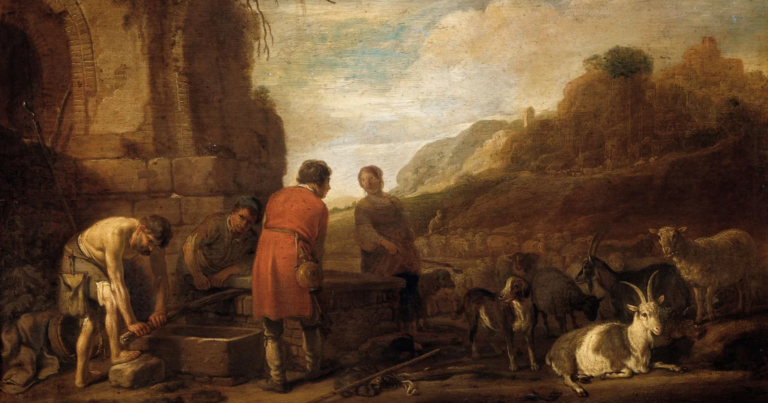“Hear, O Israel: The Lord our God, the Lord is one. Love the Lord your God with all your heart and with all your soul and with all your strength.”
Deuteronomy 6:4-5
Deuteronomy is a book that reminds us what it means to follow God.
It’s like a final, powerful speech from Moses, telling us how to love God and live right.
This book is more than just old rules — it’s about staying close to God in everything we do.
As we go through Deuteronomy, we’ll discover clear, simple advice on how to make our faith stronger and our lives better.
Let’s explore the Book of Deuteronomy and how it teaches us to choose a path that keeps us connected to God, showing kindness, and making choices that are good for us and the people around us.
What is Deuteronomy?
The Book of Deuteronomy, known as “Hadabarim” in Hebrew or “the Words,” represents a crucial component of the Torah or Pentateuch.
It marks the culmination of the Law of Moses, which includes Genesis, Exodus, Leviticus, Numbers, and itself.
Positioned as the fifth book, Deuteronomy serves a dual purpose:
- It recaps the Ten Commandments;
- It outlines additional laws forming the Deuteronomic Covenant — distinct from those given at Sinai.
These include provisions for warfare, kingship, and centralized worship.
Deuteronomy is structured into three discourses by Moses, alongside a detailed epilogue.
These speeches are delivered as the Israelites stand on the brink of entering the Promised Land, encapsulating lessons from their forty-year journey and God’s providence.
The book underscores the Covenant with God, featuring a second rendition of the Ten Commandments and the Shema — proclaiming faith in the one Lord God of Israel.
Composition of the Book of Deuteronomy
Deuteronomy is organized into three distinct discourses delivered by Moses. In the end, these chapters are followed by an epilogue that encompasses his final acts and blessings upon the Israelites.
Here’s a brief overview of the structural arrangement of the Book of Deuteronomy:
- Historical review and exhortation (1:1 – 4:43): This portion revisits the Israelites’ journey from Egypt to the brink of the Promised Land, emphasizing the lessons learned and the importance of obedience to God’s commands.
- God and His covenant (4:44 – 11:32): Here, Moses delves deeper into the nature of the Covenant between God and Israel. Then, he reiterates the Ten Commandments and introduces the Shema as a declaration of faith in God’s singularity and sovereignty.
- Exposition of the law (12:1 – 26:19): This segment provides a detailed account of the laws governing the Israelites’ conduct, societal organization, and worship practices.
- Epilogue (27:1-34:12): The concluding part narrates Moses’ final days, his blessings for the tribes of Israel, the commissioning of Joshua as his successor, and ultimately, Moses’ death.
Through these discourses, Deuteronomy not only recapitulates key events and laws from the Israelites’ history but also sets forth guiding principles for their future.
Thus, the book’s structure mirrors its dual function as both a record of divine providence and a manual for righteous living under God’s Covenant.
7 main ideas from Deuteronomy explored
1) Covenant with God
Deuteronomy is fundamentally about renewing the covenant between God and His people.
Moses calls upon a new generation of Israelites — those about to enter the Promised Land. He tries to reaffirm their commitment to God’s commandments.
However, this renewal is not merely a repetition. Instead, it’s an invitation to live in a relationship defined by loyalty, obedience, and trust in God.
Through Moses’ speeches, the book emphasizes that adherence to the covenant is crucial for the community’s survival and prosperity in the land they are about to inherit.
The renewal of this covenant underlines the dynamic nature of faith — a continuous call to commitment and re-commitment to God’s laws and love.
2) Laws and commandments
Deuteronomy is full of laws and commandments that God directly delivered to the Israelites.
Far from being mere rules, these guidelines aimed at fostering a strong community and keeping the people closely connected to God.
To prove this, the book repeats many laws found in earlier books of the Bible but adds more detail on how to apply them in daily life.
For example, it talks about being fair in business, taking care of the poor, and making sure justice is done in courts.
Either way, the idea is simple: when we follow these guidelines, we create a community that respects each other and honors God.
3) Prophecy and messianic expectation
Deuteronomy also hints at what’s coming in the future, including the promise of a prophet like Moses (Deuteronomy 18:15-19).
This is exciting because it’s not just about looking back at what God has done. Instead, the book encourages us to look forward to what He will do.
Christians believe this prophecy points to Jesus, who would speak God’s words just like Moses did.
The book sets up this expectation of someone special who will guide the people even closer to God. Therefore, it’s about hope and the promise that God always has a plan for us.
These sections of Deuteronomy remind us that living a good life involves following God’s guidelines and staying hopeful about the future.
The laws help us know how to live, and the prophecies keep us looking forward to God’s promises.
4) Declaration of monotheism
Deuteronomy makes it clear that there’s only one God.
Why is that a big deal?
Because it set the Israelites apart from other groups at the time who believed in many gods.
The most famous line, “Hear, O Israel: The Lord our God, the Lord is one” (Deuteronomy 6:4), is a powerful declaration of this belief.
This statement isn’t just about believing in one God. It’s also a call to love and commit to this one God with all our heart, soul, and strength.
For us today, it means our faith and loyalty should be solely to God, shaping how we live every day.
4) Social laws in Deuteronomy
Deuteronomy isn’t all about spiritual laws — it has a lot to say about how to treat each other.
In particular, this book includes rules that make sure everyone in the community is looked after.
For example, it talks about taking care of the poor, making sure widows and orphans are okay, and being fair to foreigners living among the Israelites.
Believe it or not, these laws were revolutionary at the time, showing a deep concern for social justice and kindness that reflected God’s character.
And today, these laws remind us to care for those in need and to build communities where everyone is valued and supported.
5) Obedience as a form of worship
In Deuteronomy, obeying God’s laws is more than just following rules.
It’s an act of worship.
When the Israelites choose to obey, they’re not just avoiding doing wrong; they’re actively showing their love and respect for God.
This idea is woven throughout the book, reminding us that how we live every day reflects our relationship with God.
For instance, when we choose to be honest in our dealings or generous to those in need, it’s a way of honoring God, not just a good deed.
This perspective transforms obedience from a duty into a heartfelt expression of our faith.
6) Choosing life over death
A specific passage in Deuteronomy presents us with a powerful choice:
“I have set before you life and death, blessing and cursing: therefore choose life, that both thou and thy seed may live” (Deuteronomy 30:19).
This moment is a call to the Israelites to choose to follow God’s ways, which lead to life, over turning away from Him, which leads to destruction.
As for me, this quote is enough to understand how important it is to make choices every day that align with God’s will. That’s how we can receive a fulfilling and meaningful life.
For example, choosing life might look like deciding to forgive someone instead of holding onto anger, or choosing to spend time helping others instead of only focusing on personal gains.
These choices reflect a commitment to living in a way that brings life and joy, not just to ourselves but also to those around us.
Therefore, this passage encourages us to consider the long-term impact of our decisions and to choose paths that lead to life and blessing.
7) The legacy of Moses
The final chapters of Deuteronomy detail the last acts of Moses — his blessings over the tribes of Israel, the commissioning of Joshua as his successor, and his death.
These passages not only serve as a poignant farewell from the Israelite leader but also encapsulate his enduring legacy: a life devoted to serving God and guiding His people.
Moses’ journey — from prince of Egypt to shepherd of a nation — embodies the transformative power of faithfulness amidst adversity. His story offers timeless lessons on leadership, humility, and unwavering trust in God’s promises.
Is Deuteronomy relevant today?
As you can see, the Book of Deuteronomy might seem old, but it’s still full of wisdom for us today.
The thing is that it talks about sticking close to God, following His ways, and loving Him with everything we’ve got. These ideas are just as important now as they were back then.
Here’s how Deuteronomy can guide us today:
- Remembering what God has done: Just like the Israelites, remembering the good things God has done for us can help us trust Him more.
- Choosing to do right: Deuteronomy tells us about being fair and kind to others, especially those who need help. This teaches us to always look out for each other.
- Loving God fully: The book reminds us to give God our whole heart. This means putting Him first in our lives.
In essence, Deuteronomy isn’t just an old book — it’s a guide for living a good life that’s pleasing to God. It shows us how to be faithful, just, and loving in the world today.











